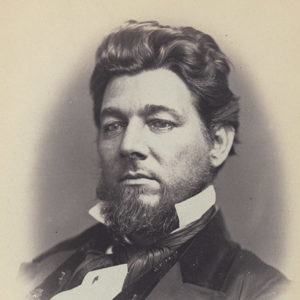calsfoundation@cals.org
Edward Allen Warren (1818–1875)
Edward Allen Warren was a Democratic member of the U.S. House of Representatives. He represented the Second District of Arkansas in the Thirty-Third and the Thirty-Fifth Congresses, serving from 1853 to 1855 and then again from 1857 to 1859.
Edward A. Warren was born near Eutaw, Alabama, on May 2, 1818, to Robert H. Warren and Lydia A. Minter Warren. He received his early education in the area’s local schools, and he then studied law on his own. He married in October 1838, and he and his wife, Mary Elizabeth Warren, went on to have two children. He was admitted to the state bar in 1843, after which he began to practice law in Clinton, Mississippi. Like many young lawyers, Warren soon entered into politics, winning election to the Mississippi House of Representatives and serving from 1845 to 1846.
In 1847, Warren moved to Arkansas. Settling in Camden (Ouachita County), he opened a new law practice. As he had in Mississippi, Warren again entered the political arena. Despite being a newcomer, the young Democrat won a seat as a member of the Arkansas House of Representatives in 1848, overseeing the business of the House as the speaker in 1849. Warren next served as a judge on the circuit court of the Sixth District of Arkansas.
Again running as a Democrat, Warren was elected to Congress in 1852 but served only a single term before deciding not to seek reelection. While in Congress, he served on the Committee on Public Lands. However, after his successor, Albert Rust, turned in a lackluster performance in the House, the Democratic Party in 1856 turned back to Warren, who, despite being out of office during the previous term, was successful in his bid for a second term. However, Warren again chose not to seek reelection. Instead, the two-term congressman returned to Arkansas and resumed the practice of law.
Warren was practicing law when the Civil War broke out. Out of an extended, if initially inconclusive, state secession convention that first convened in March 1861, Warren was selected to represent the state at a May 1861 convention of border states called for by Virginia. However, the convention—convened in Frankfort, Kentucky—proved an empty act, for only Kentucky and Missouri were represented at it; Virginia had itself seceded, and Arkansas was officially, if not fully, engaged in the Confederate effort, thus eliminating the need for Warren to attend.
Warren devoted the rest of life to his law practice and his family. He died on July 2, 1875, in Prescott (Nevada County) and is interred in Moscow Cemetery near Prescott.
For additional information:
“Death of Edward A. Warren.” Arkansas Gazette, July 6, 1875, p. 2.
“Edward Allen Warren.” Biographical Directory of the United States Congress. http://bioguide.congress.gov/scripts/biodisplay.pl?index=W000163 (accessed September 14, 2021).
William H. Pruden III
Ravenscroft School
 Louisiana Purchase through Early Statehood, 1803 through 1860
Louisiana Purchase through Early Statehood, 1803 through 1860 E. A. Warren
E. A. Warren 




Comments
No comments on this entry yet.